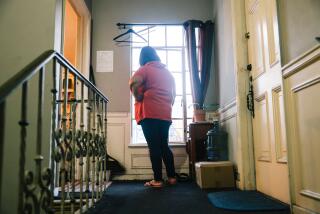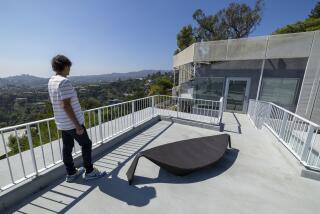Property Disputes Turn Kosovo Into No Man’s Land
PRISTINA, Yugoslavia — A stark warning scratched into the black paint of a broken security door awaits anyone who tries to evict Bekim Arifi and his family again.
Their own home, a two-room farmhouse on a Kosovo hilltop several miles from here, was burned by Serbian gunmen last spring, so the Arifis became squatters in a middle-class Serbian family’s apartment in this provincial capital.
The terse notice on the metal door is written in Albanian, starting with the letters UCK, the Albanian-language initials of the former Kosovo Liberation Army. In case that message isn’t clear enough, it adds: “Do not touch.”
Those words appeared sometime after Bina Djukic locked the door and hurried down the stairs four months ago, in the panic that struck Serbs as their security forces retreated from Kosovo.
She is among an estimated 170,000 people, mostly Serbs, who fled the southern province of Serbia--Yugoslavia’s main republic--after NATO-led peacekeeping troops arrived in June and ethnic Albanians began attacking Serbs, Gypsies and ethnic Albanian “collaborators.”
The North Atlantic Treaty Organization intervened in Kosovo’s civil war on the side of multiethnic democracy, and now a poorly equipped and understaffed U.N. civilian administration is trying to build such a system atop Kosovo’s ruins.
Besides moral suasion, and the power of decree, the best weapon that chief U.N. civilian administrator Bernard Kouchner is likely to have is the justice system that his officials are still working to set up.
Leopold von Carlowitz, an aristocratic German lawyer, is working to create a tribunal that will try to resolve the thousands of property disputes born of the war in Kosovo.
He has no illusions about the many and complex problems involved--or about how dangerous Kosovo will be if disputes over who owns various pieces of it are left to fester.
“We all know that only with a sound solution of the property situation in this country will we have lasting peace here,” Von Carlowitz said in an interview. “There is no question about that.”
One of Djukic’s neighbors, Dragica Grubanovic, also fled Kosovo and knows the ethnic Albanian man who took over her apartment only by his voice. She has called him several times, hoping he would agree to buy it, but he has refused. He has since stopped answering the phone.
Grubanovic, the former director of legal affairs for Serbia’s state-run radio station in Pristina, would be happy to forget Kosovo and stay in Belgrade, the capital of Serbia and Yugoslavia.
She has found an ethnic Albanian man in Belgrade interested in buying her three-bedroom apartment. But like other potential buyers, he wants the current occupants evicted first. And after what the Serbs did in Kosovo, ethnic Albanians are in no hurry to give up their new homes.
“They think that the apartments were given to them by ‘their state’ and that we Serbs have nothing to ask for, since they won [the war],” Grubanovic said.
It was after ethnic Albanian thugs began pounding on Serbs’ doors and threatening trouble if they didn’t leave that Djukic took her family to her father’s home in the Pristina suburb of Kosovo Polje, hoping things would improve.
A few days later, Djukic’s father visited the British troops’ command post across from his house, and an officer assigned two soldiers to escort him back to his daughter’s home, in Pristina’s Sunny Hill district.
They found the security door pried open and the inside door’s lock and handle smashed off. About a dozen ethnic Albanians had taken over the home.
“The Brits gave my father 30 minutes to take out our personal possessions,” Djukic said in Belgrade, where she is now a refugee in her own country. “The Albanian men told them my father had nothing to do with the place and that the apartment had been given to them by ‘the army.’ ”
New occupant Arifi, 22, denies--despite the initials on the door--that he served in the guerrilla Kosovo Liberation Army, which fought a separatist war against the Serbs. Among those sharing the apartment is Arifi’s brother Agim, 20, who says he wasn’t a KLA member either.
Bedrie, Arifi’s wife, and his younger sisters, Naile, 11, and Elhame, 17, also moved into the Djukic apartment after returning from Albania, where they were refugees after Serbs expelled them from Kosovo during NATO air attacks.
Arifi claims that Djukic’s father said to keep the place when he came with the two British soldiers to collect the family’s belongings--everything except a beautiful cabinet with glass doors that stands empty in the living room.
“We insisted on keeping that,” Arifi said through a translator.
U.N. staff have drafted a regulation that would create an independent Housing and Property Claims Tribunal to settle disputes over such strictly private, noncommercial property.
The tribunal would have two foreign members and one local member. These three individuals would have the power to make legally binding decisions, but U.N. staff also would work to get disputes settled out of court--for instance, by finding people new homes.
Kouchner, Kosovo’s top administrator, needs approval from U.N. headquarters in New York before he can sign the regulation to create the tribunal, and U.N. experts are only beginning to sort through “incredibly complicated,” sometimes conflicting regulations and traditions to decide which ones the tribunal would respect.
“This is very dangerous territory on which we’re moving,” Von Carlowitz cautioned.
Djukic knows the risks all too well. She was the deputy public prosecutor in Pristina’s Serb-run courts, and she has watched the endless cycle of revenge claim members of her own family.
One was her uncle, Srbislav Djukic, 75, a resident of the northern Kosovo city of Podujevo, which was surrounded by KLA hard-liners until NATO began bombing March 24.
Serbian forces cut through the region like a scythe, burning, looting and killing as they went. And when the Serbian forces retreated, ethnic Albanian extremists exacted revenge on the few Serbs left.
Djukic’s uncle was patriarch of the last Serbian family in the village of Sekiraca, where he had helped protect ethnic Albanian neighbors by persuading Serbian attackers to pass the village by, Djukic said.
“That was the only village in the area that was spared by the Yugoslav army and police during the bombing, because my uncle told them the village had always been peaceful,” Djukic said. “After the war ended, ethnic Albanian neighbors guaranteed my uncle’s safety.
“He was killed on his first visit to Podujevo [in July]. His house was burned and rolled over by a bulldozer,” she said. “Ten days later, they killed my cousin [Grujica Gajic, 38] in the village of Lebane, near Pristina.
“Ten days after that, they killed my nephew [Dejan Nicic, 25]. He was massacred. At the morgue, his head was connected to his body only by the skin. He was chased up onto a roof and murdered with sticks and stones.”
Djukic and her husband, a bank economist, had fled Kosovo weeks earlier after packing what little they could into a Yugo already crammed with their three children, ages 9, 16 and 18.
The Djukics made sure that they took the title to their apartment and the receipts for all the payments they had made before officially acquiring it from her husband’s bank Jan. 29, 1993.
Djukic has called Arifi several times and tried to persuade him to buy the apartment, which is now worth about $45,000. But Arifi insists that he is penniless, yet he has refused to move out and allow Djukic to sell her home to someone else.
In late September, Djukic joined a convoy of Serbs in two buses and 15 cars, which was escorted into Kosovo by Belgian troops. Most of the Serbs wanted to file property complaints with the U.N. police in Pristina, Djukic said.
The convoy stopped at Kosovo Polje, a mainly Serbian enclave, and Djukic said she couldn’t convince an ethnic Albanian friend to risk driving her into Pristina.
She waited in the suburb for eight days, during which three Serbs died in a grenade attack and another was killed at a school. Finally, she gave up and caught a Belgrade-bound train, which an ethnic Albanian mob stoned as it left.
“My father is 67 years old and has three children. We all grew up in that Kosovo Polje house,” Djukic said. “Now he is trapped there, all alone with a dog and parrot. If he leaves, he knows the house will be looted right away.”
About 12 miles south, beside a chestnut tree on a hilltop in the village of Labljane, the Arifis’ small house is a burned-out ruin, and everything they owned is gone.
That is why the Arifis hope the Serbs who left Kosovo--a land Serbs have fought for centuries to defend as the cradle of their Orthodox culture--never return.
“We wouldn’t like to lay our eyes on them again--ever,” said Bedrie, Arifi’s wife. “They killed kids in their mothers’ laps.”
Then her brother-in-law Agim jumped in: “If they come back, there will be trouble.”
More to Read
Sign up for Essential California
The most important California stories and recommendations in your inbox every morning.
You may occasionally receive promotional content from the Los Angeles Times.










